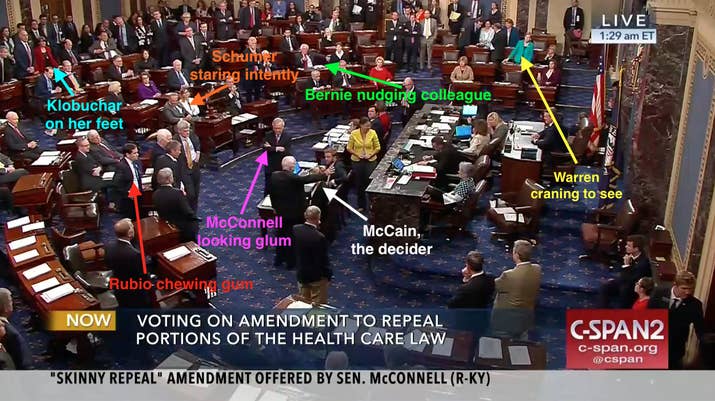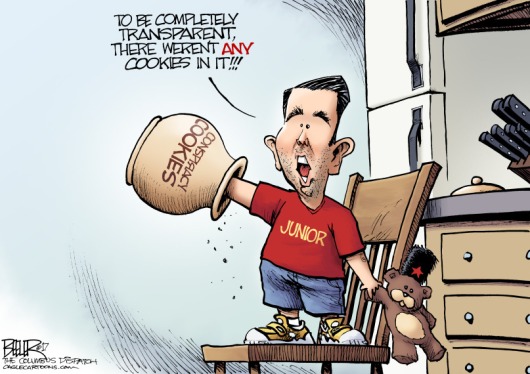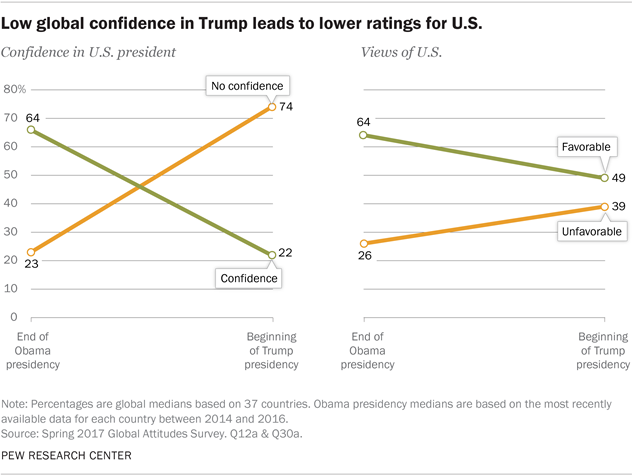This process is an embarrassment. This is nuclear-grade bonkers, what is happening here tonight. We are about to re-order one-fifth of the American healthcare system. And we are going to have two hours to review a bill which, at first blush, stands essentially as healthcare-system arson.
- Senator Chris Murphy on the floor of the Senate Thursday night
This week's featured post is "How to Fix ObamaCare". The "Misunderstood Things" series is taking a week off.
This week everybody was talking about the craziest week yet of the Trump administration
Every day of American politics since January 20 has had a tinge of insanity or absurdity to it, but this week stood out. You can use the links to get the details, and I'll comment on some of these events below, but try to read the whole list before you delve deeper on any particular thing. I think it's worthwhile to stand back for a moment and take in the full lunatic-asylum landscape:
- Wednesday morning, Trump tweeted a new policy banning transgender people from the military, which the Pentagon then announced that it would ignore.
- Thursday, four Republican senators held a press conference. They described Mitch McConnell's latest ObamaCare repeal bill as "half-assed" and "a disaster", but offered to vote for it if Paul Ryan could guarantee them that it would never become law. (Three of them of them did vote for the bill early Friday morning, despite only having the bill's text available for two hours before voting. The fourth -- McCain -- cast the vote that killed it.)
- Trump spent most of the week denouncing his own attorney general as "VERY weak" and "beleaguered". Trump said he was "very disappointed" in Jeff Sessions, but didn't fire him. Sessions described Trump's comments as "hurtful", but didn't resign.
- Tuesday, Trump turned a homey presidential tradition -- addressing the Boy Scout Jamboree -- into an ugly political event that inspired comparisons to the Hitler Youth. Thursday, the Chief Scout Executive issued an apology for the President's behavior.
- Wednesday night, Ryan Lizza of The New Yorker got called by new White House Communications Direction Anthony Scaramucci, who spoke on the record. He described Chief of Staff Reince Preibus as "a fucking paranoid schizophrenic", and claimed to differ from Steve Bannon because "I’m not trying to suck my own cock." Trump backed him up, and by Friday Preibus was gone. For the moment, Bannon continues as Chief Strategist, though his contortionist abilities remain unverified.
- Friday afternoon, Trump addressed police in Ronkonkoma, New York. He spoke warmly of "thugs" being "thrown" into the back of a paddy wagon "rough", and asked officers "please don’t be too nice" when arresting people. The Suffolk County Police Department responded, "As a department, we do not and will not tolerate roughing up of prisoners."
- That speech was not the only one in which Trump reprised the false narrative of his speech at last summer's Republican Convention, that the main criminal threat in America comes from Muslim terrorists and Hispanic gangsters. In Youngstown on Wednesday he denounced "predators and criminal aliens who poison our communities with drugs and prey on innocent young people", talked about immigrant gangsters who "slice and dice" their victims, and said "these are the animals that we've been protecting for so long."
And that's just a quick summary.
The big question is why. Why unleash such a big dose of the Crazy now? Why take a turn back towards fear-mongering, rabble-rousing, and not-so-veiled calls for violence? I think it's the Russia investigation. Jared had to testify this week (in closed sessions), and Don Jr. will follow soon. If they continued the patterns of their previous statements, they'll set themselves up for perjury charges. And as Mueller investigates Trump's past ties to Russian money-laundering, Trump alone knows what he might find.
Mueller is slow but dogged. On any given day, it's easy to drive the investigation out of the headlines with some new bit of insanity. But its mills are grinding.
Also, Trump's supporters are starting to crack. He's beginning to hear criticism from Republicans in Congress, and even from his evangelical base.
and TrumpCare's dramatic defeat in the Senate
Buzzfeed's David Mack compared the Senate floor at the moment of McCain's vote to a Renaissance painting.
 McCain had puzzled us all earlier in the week. He returned from brain surgery Tuesday to cast the deciding vote that allowed the Senate to proceed to debate the various ObamaCare repeal options, but then gave an idealistic speech calling for a return to regular order and a bipartisan process, rather than the secretive Republicans-only process that his own vote had just allowed to continue. This struck author Mike Lofgren as typical of McCain, and he wrote: "None of us vain creatures can bear scrutiny of the gap between our words and our deeds—but few, I fear, would suffer from that scrutiny more than John McCain."
McCain had puzzled us all earlier in the week. He returned from brain surgery Tuesday to cast the deciding vote that allowed the Senate to proceed to debate the various ObamaCare repeal options, but then gave an idealistic speech calling for a return to regular order and a bipartisan process, rather than the secretive Republicans-only process that his own vote had just allowed to continue. This struck author Mike Lofgren as typical of McCain, and he wrote: "None of us vain creatures can bear scrutiny of the gap between our words and our deeds—but few, I fear, would suffer from that scrutiny more than John McCain."
Whatever he was waiting to hear during that debate, though, he apparently didn't hear it. Or maybe he was just waiting for a more dramatic moment.
The repeated failure of ObamaCare repeal plans make it clear that "replace" was never more than a slogan for Republicans. Their voters liked the idea of some vague "replacement" that would keep all the good things about ObamaCare and do away with all the bad things, but there never was such a plan.
The question now is: Can Congress start doing what it should have been doing since the ACA passed in 2010: look at the results and make adjustments so that ObamaCare works better. I collect some suggestions about that in the featured post.
and the White House reshuffle
Friday, Reince Preibus was literally left at the airport as the Trump motorcade returned to the White House. I was reminded of Jim Comey being told about his firing by someone who saw it on CNN. Classy.
As of today, Preibus is replaced by former Homeland Security Secretary John Kelly. I am pessimistic about his ability to fix the problems in the White House, because they all trace back to Trump himself. For example, Dara Lind points out the underlying reason for the leaking problem: Trump watches TV, but he doesn't read memos. If a staffer wants to get the President to pay attention to an idea, s/he needs to get that idea on TV.
and you also might be interested in ...
Fascinating analysis by black comedian D. L. Hughley of the Trump base and why it doesn't care about the Russia scandal. In their view, he says, "America left them" by electing a black president and approving gay marriage and letting all those Hispanics into the country. Now "America is dead to them." If conspiring with Russia makes it possible for Trump to give them back the America their kind of people used to dominate, then that's fine.
Hughley compares the situation to the Bible story in which King Solomon offers to cut a baby in half to resolve two women's claims to be its mother. (One of them actually had a different baby, who died.) Solomon knows the true mother, because she begs to surrender the child rather than let it be killed. But Trump supporters are like the other woman, who feels so aggrieved that she would let Solomon divide the baby. If her baby is dead, then the other woman's baby might as well die too. They don't care if Trump conspired with an enemy power, because if he kills American democracy, so what? America is already dead to them.
Trump's Youngstown and Ronkonkoma speeches, where he talked at length about the "animals" in the MS-13 gang, were both chilling in similar ways. Vox's Brian Resnick spells it out:
Trump doesn’t clearly differentiate between criminal and peaceful immigrants living in the United States, nor does he care to. But Trump’s language is also dangerous, because it’s blatantly dehumanizing.
When we refer to people as “animals” or anything other than “people” it flips a mental switch in our minds. It allows us to deny empathy to other people, makes us feel numb to their pain, and lets us forgive ourselves from causing them harm.
Vox's Dara Lind described Trump's staff reshuffle as a "dark reboot" that will re-center the administration's message on "making America afraid again". That fear is a justification-in-advance of the cruelty to come -- the cruelty that is already here. When MS-13 is the face of all immigrants, Trump's base can happily watch ICE rip mothers away from their children.
The backstory of Trump's transgender ban is amazing. It starts in the House, in a disagreement between Republicans about whether the new budget should ban insurance programs for the military that might pay for gender-transition surgery. The anti-transgender Republicans were losing and appealed to Trump for help. What they got instead was:
The United States Government will not accept or allow transgender individuals to serve in any capacity in the U.S. Military.
The Republican senators who pushed back against this make quite a list, including as Orrin Hatch, John McCain, and Joni Ernst . The prevailing opinion seems to be that if you're willing to be shot at for America, America should let you do it.
And then the Chairman of the Joint Chiefs basically said "never mind":
“I know there are questions about yesterday’s announcement on the transgender policy by the President,” Marine General Joe Dunford, the chairman of the Joint Chiefs of Staff, wrote in an internal memo obtained by Politico. “There will be no modifications to the current policy until the President’s direction has been received by the Secretary of Defense and the Secretary has issued implementation guidance.” In what reads like a rebuke of the policy Trump outlined on Twitter, Dunford added, “In the meantime, we will continue to treat all of our personnel with respect . . . and will all remain focused on accomplishing our assigned missions.”
Some commenters are worried by the prospect of the Pentagon ignoring civilian orders, which would indeed be a worrisome thing. But a tweet is not an order. If it were, then anybody who hacked Trump's Twitter account -- don't tell me that's impossible -- would become commander-in-chief. (To paraphrase the inscription on the hammer of Marvel's Thor: "Whosoever hacks this account, whether he be worthy or not, shall wield the power of Trump.") Also: one of the proper ways to respond to a vague order that comes out of the blue is to ask for more specific instructions. (i.e., "Open fire" ... "On what?") That's what Dunford did.
In the end, though, it looks like this decision is really up to Congress, if it chooses to exercise its authority.
While we're on the subject, my favorite response to the transgender ban came from the female writers for Seth Meyers, who trolled self-proclaimed LGBT ally Ivanka Trump.
and let's close with something amusing
When you're a scientist flying to or from a conference, you often wind up carrying things you have a hard time explaining to TSA, like a 3D-printed model of a mouse penis, enlarged to the size of an 11-foot mouse. Or maybe a Nobel Prize. ("Who gave this to you?" "The King of Sweden.")







/cdn.vox-cdn.com/uploads/chorus_asset/file/8781181/BCRA_final_.png)


